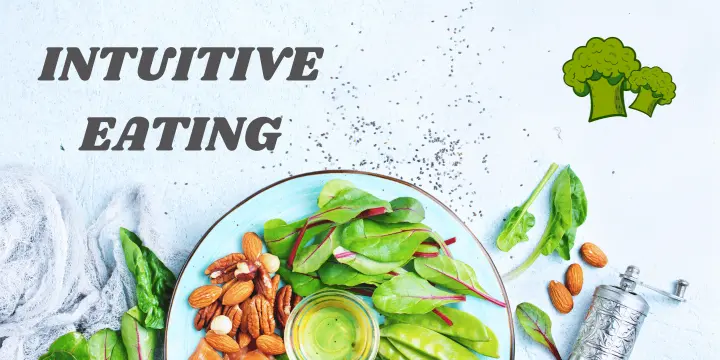Guide to Intuitive Eating: Principles, Getting Started, Tips & More
Tired of diets that make you feel like a mathematician counting calories? Enter the scene-stealer—intuitive eating!
It’s not just a trend; it’s the Beyoncé of healthy living, promoting a vibe that’s all about balance and banishing the food police.
In a universe filled with “eat this, not that,” intuitive eating is the cool rebel, saying, “Eat what feels good, whenever it feels right.”
So, grab your popcorn (or kale chips, if that’s your jam) because we’re about to spill the beans (or chickpeas) on why intuitive eating is the hottest thing since sliced avocado toast.
What is Intuitive Eating?

Intuitive eating is an approach to nutrition and eating that emphasizes listening to and trusting your body’s internal cues rather than relying on external diet rules or restrictions.
The concept was developed by dietitians Evelyn Tribole and Elyse Resch in the 1990s.
It is like having a chat with your body. It’s about paying attention to what it needs, like when it’s hungry or craving a burger instead of a salad. No more rulebooks; just good Ol’ communication with your body.
Unlike diets that tell you what, when, and how much to eat, intuitive eating flips the script. It’s about trusting your body’s signals—eating when you’re hungry, stopping when you’re satisfied.
Simple, right?
No complicated rules, just listen to what your body tells you.
The 10 Principles of Intuitive Eating
Birth of Intuitive Eating Principles
In 1995, Evelyn Tribole and Elyse Resch published a book titled “Intuitive Eating,” laying down the foundations of this revolutionary approach. The principles they laid out weren’t about restriction or punishment. Instead, they were a roadmap for embracing a healthier relationship with food.
Fast forward to today, intuitive eating has evolved from a hush-hush rebellion against diets to a mainstream movement.
It’s not a diet; it’s a mindset shift, a way to break free from the diet culture shackles.
Without further ado, let’s jump right into the 10 principles of intuitive eating.
1. Reject the Diet Mentality
Ever been on a diet that felt like a rollercoaster of hope and disappointment? We get it. Traditional diets often fail because they’re like that unreliable friend who promises the moon but never delivers.
The first step to food liberation? Dump the diet mentality.
It’s time to break the idea that a rigid set of rules will bring happiness.
2. Honor Your Hunger
Your stomach growling is your body’s way of saying, “Hey, I need fuel!” Ignoring it only leads to a hangry disaster.
Honor your hunger, respond to it like a good friend, and watch how it transforms your relationship with food.
3. Make Peace with Food
Food isn’t a morality play. It’s time to ditch the labels of “good” and “bad.” Let’s make peace with all foods – yes, even that chocolate cake.
When you eliminate the food guilt, you open the door to a more balanced and enjoyable way of eating.
4. Challenge the Food Police
Those negative thoughts about your food choices? It’s time to kick them to the curb. The food police have no place in your head.
Challenge those judgments, embrace a positive mindset, and watch how it transforms your eating experience.
5. Discover the Satisfaction Factor
Food isn’t just fuel; it’s an experience. Embrace the satisfaction factor. Enjoy your meals, savor each bite, and make eating a pleasure cruise rather than a rushed task.
6. Feel Your Fullness
Ever had that “I ate too much” moment? Your body gives you signals when it’s had enough. Tune in, feel your fullness, and learn when to hit the brakes. It’s the key to eating in harmony with your body’s needs.
7. Cope with Your Emotions without Using Food
Food isn’t a therapist, but it often gets cast in that role. Explore alternative ways to manage emotions—whether it’s a walk, a journal, or a chat with a friend.
When you separate emotions from eating, you gain a new level of control.
8. Respect Your Body
Your body is pretty amazing. Instead of fixating on how it looks, focus on what it can do. Embrace self-acceptance, celebrate your body for its strengths, and let go of unrealistic appearance ideals.
9. Exercise – Feel the Difference
Exercise doesn’t have to be a punishment. Find activities that bring you joy. Whether it’s dancing, hiking, or yoga, move a celebration rather than a chore.
10. Honor Your Health with Gentle Nutrition
Nutrition is important but ditch the strict rules. Honor your health by adopting a balanced approach. It’s about overall well-being, not a checklist of do’s and don’ts.
Getting Started – How to Eat Intuitively

Getting started with intuitive eating involves adopting a mindset that values your body’s signals, rejecting diet culture, and building a more positive relationship with food.
Here are some tips to help you get started:
- Read books or articles on Intuitive Eating.
- Let go of strict diet rules.
- Challenge societal norms promoting unrealistic body standards.
- Eat all foods without guilt or judgment.
- Pay attention to foods that energize you or make you feel good.
- Differentiate between eating due to physical hunger and emotional triggers.
- Stop eating when you feel satisfied, not overly full.
- Question the concept of “good” and “bad” foods.
- Find alternative ways to cope with emotions.
- Explore activities like walking, journaling, or talking to a friend.
- Shift focus from changing your body to nourishing and caring for it.
Author’s Opinion – Liberating Yourself from the Traditional Diets
As we wrap up our exploration of intuitive eating, let’s reflect on the empowering choice to ditch traditional diets in favor of a more liberating approach to nutrition.
Traditional diets have long been the protagonists in a narrative of restriction, rules, and often, disappointment. The constant cycle of deprivation, followed by guilt, has left many feeling disheartened and disconnected from the true joy of eating.
Intuitive eating emerges as the hero of our story—a refreshing alternative that encourages you to break free from the chains of diet culture. It’s a call to reject the one-size-fits-all mentality that traditional diets impose. Instead, it offers a personalized, flexible, and sustainable way to nourish your body.
So, here’s to liberating yourself from the conventional diet narrative, embracing the freedom to enjoy food without the weight of guilt, and savoring each moment of your intuitive eating journey.
May every bite be a celebration of choice, every meal a moment of nourishment, and every step a stride toward a more fulfilling and authentic relationship with your body and food!
Frequently Asked Questions (FAQs)
A: Intuitive eating is a nutrition philosophy based on listening to your body’s cues, honoring hunger and fullness, and making food choices based on satisfaction and well-being rather than external diets or rules.
A: Intuitive eating doesn’t follow a strict routine. It encourages individuals to eat when hungry, stop when comfortably full, and choose foods that bring satisfaction. It’s about cultivating a mindful and instinctive approach to eating.
A: Yes. Intuitive eating focuses on overall well-being rather than weight loss. It promotes a healthy relationship with food and your body. While weight loss isn’t the primary goal, some people may experience changes in their weight as a result of adopting intuitive eating.
A: The 10 basic principles of intuitive eating include rejecting the diet mentality, honoring hunger and fullness, making peace with food, and trusting your body. The 11th principle, often considered foundational, involves embracing the genetic blueprint and recognizing that bodies come in various shapes and sizes.
A: Mindful eating involves consuming food with conscious awareness, emphasizing being fully present in the moment, savoring sensory experiences, and cultivating a positive connection with your meals.
A: Registered dietitians can provide valuable support in adopting intuitive eating, offering guidance on listening to hunger cues, making mindful food choices, and fostering a healthy relationship with food.
A: Intuitive eating aims to improve body image by encouraging individuals to respect their bodies, make peace with food, and adopt a positive attitude toward their size and shape.






